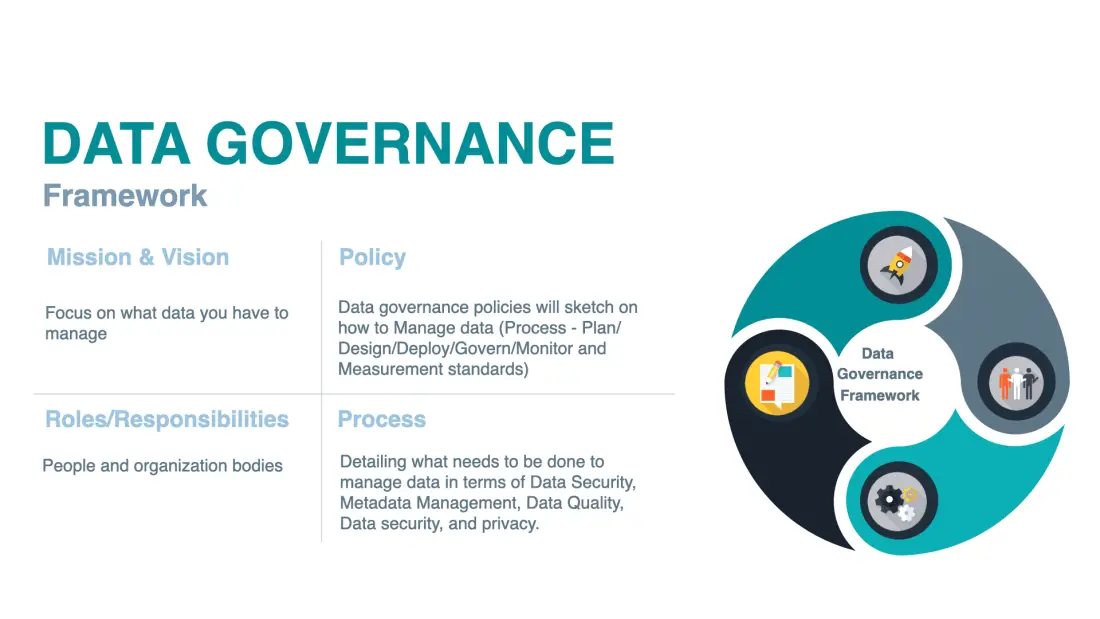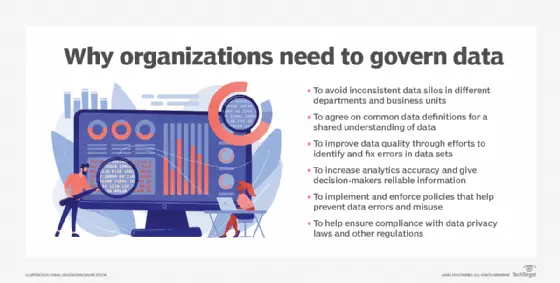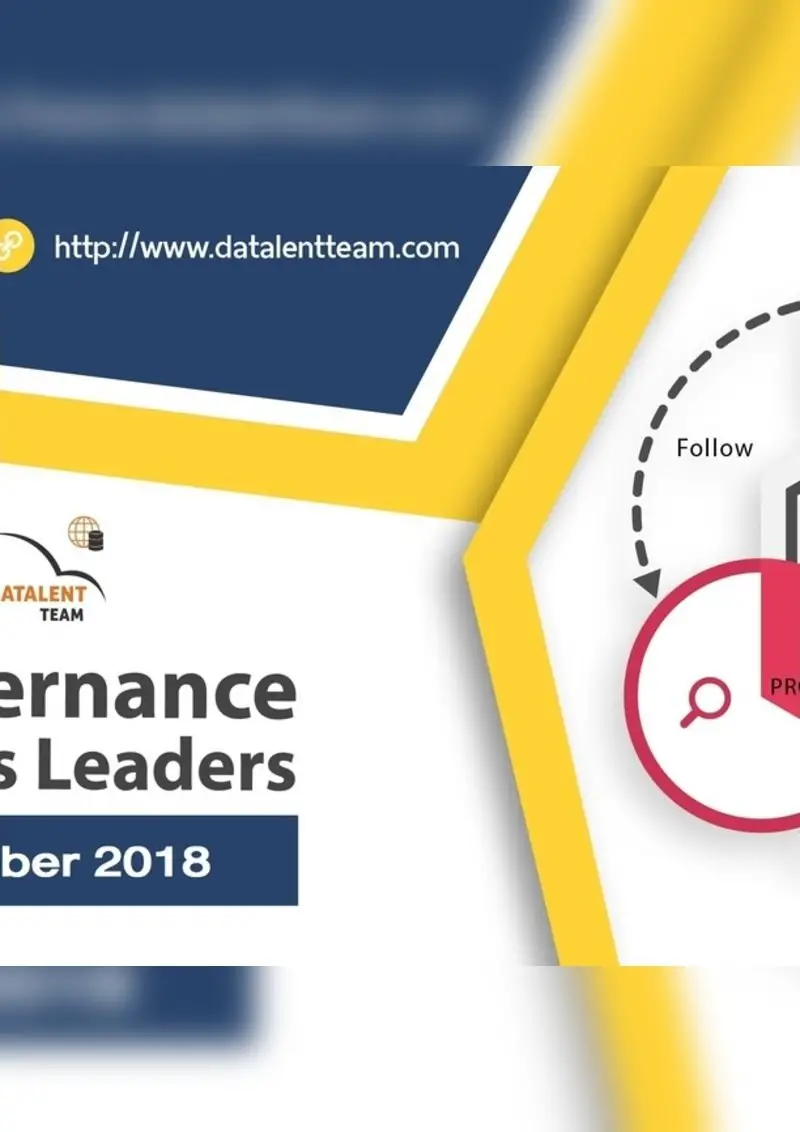The Cost Of Data Governance
One of the companies we spoke with has an initiative to develop global excellence through global functions rather than local functions. This creates a challenge where actions in one function have an impact on other functions down the line. These bilateral actions are one of the main reasons why functions and systems need to be integrated. For example, customer development is now asking R& D for data that R& D does not have in its system, and supply chain needs data for planning purposes. The R& D system now needs to harbor data that it did not harbor before. There is a debate in supply chain: which function is responsible? Which system is responsible?
There are a couple of important costs to solving these issues.
Data governance means establishing new roles and responsibilities. There is a cost associated with developing the new organization. But as one food service client states, The cost of not doing it is of such proportions that it is foolhardy not to take it on.
Organizational change management. Companies that move to a data governance model often must break down a siloed organization that uses functional processes. The new way of working can be achieved only when processes are aligned among different functions. Investment in change management is extremely important.
What Is A Robust Data Governance Mandate
The mandate defines the authority granted to data management roles within the organization, and from this, the responsibility. This is particularly critical for the central data management team. Are they allowed to enforce the standards and guidelines for data creation and maintenance or are they dependent on the goodwill of the business units and support functions? The type of mandate has a significant influence on the overall impact of data management on the organization. Like the mandate of a project management office , four types of mandates can be distinguished.
Q2 Who Or What Group In An Organization Should Be Responsible For Data Governance
You can start with a more vague answer and say “it depends”. But I would mention that based on best industry practices, data governance should be the responsibility of the business side of the organization, and not IT.
Depending on the size of the organization and what level on the maturity model the organization is, they might already have a Chief Data Officer office and so data governance usually falls under there. Or maybe it’s just a one person team for the time being and they could be reporting to VP of Finance, or Marketing, or Sales as an example.
The conclusion here is that data governance is the responsibility of the business, and yes, they will be in close partnership with IT for the technical deliverables and responsibilities.
Recommended Reading: Federal Government Day Care Centers
Why Data Governance Is Needed
Data governance is the lifeblood for any organization that depends on data to make important decisions. And what organization doesnt? Businesses must have good, well-governed data to ensure they derive the most benefit from this precious asset while maintaining important policies. The best, healthiest organizations in todays environment have effective data governance programs. We will see them survive and thrive while others falter. Make sure your organization is on the winning side.
The Data Intelligence company
We accelerate trusted business outcomes by connecting the right data, insights, algorithms and people for all Data Citizens.
Related resources
Data Governance Is Not Data Stewardship

Data governance ensures that the right people are assigned the right data responsibilities. Data stewardship refers to the activities necessary to make sure that the data is accurate, in control, and easy to discover and process by the appropriate parties. Data governance is mostly about strategy, roles, organization, and policies, while data stewardship is all about execution and operationalization.
Data stewards take care of data assets, making certain that the actual data is consistent with the data governance plan, linked with other data assets, and in control in terms of data quality, compliance, or security.
Also Check: How To Get Fund For Startup From Government
For Claritys Sake What Is Data Governance
It is easy to guess the meaning of data governance. Heres what someone on the street might say:
A company has a lot of data coming in externally and more data being created or updated internally, so that data should probably be governed so you have good data.
Thats a fair take, and it hits the near the heart of the definition – but it doesnt go all the way.
Data governance is a set of processes that ensures that important data assets are formally managed throughout the enterprise. It ensures that trusted information is used for critical business processes, decision making and accounting.
Now were getting there – lets unpack this further. Within this definition we have 3 main pieces of the overall data governance puzzle.
When those three factors are present and functioning together within a company, you have good data governance.
It is important to note that this definition presents 2 main requirements for data governance: the tools to allow this governance to happen, and the efforts that carry this out.
Roles In The Framework
Chief Data Officer
Chief Data Officers are a fast-growing job over the last few years. Companies are beginning to understand the importance of managing data and implementing a data governance framework, and that means hiring a CDO. The CDO is the company leader of the data governance strategy, and hiring a CDO shows the commitment to data and buy-in from the top to take a data governance program seriously.
Data Owners
Data Owners are the people that have direct responsibility for data. They are involved in the protection and quality of data as a business asset. A data owner will be on the team that uses the data. For example, a member of the finance team should be a Data Owner for the Finance teams data.
Varonis automates the process for Data Owners to manage access to their data. Data Owners know who in their organization should have access to their data, and providing them the tools they need to manage and audit access to data is good data governance.
Data Stewards
Data Stewards are the champions of your data governance strategy. They meet with Data Owners and enforce data governance policies and procedures, as well as train new data owners and employees in data governance.
Data Governance Committees
The Data Governance Committee sets policies and procedures for data governance. This committee works with the CDO to establish the who, what, when, where, and why of data governance.
Don’t Miss: Government Grant Programs For Individuals
Data Governance : What It Is Why It Is Important And How To Achieve It
Data governance should be on top of any C-levels agenda, but more often than not it isnt. In this article we will give you an overview of what data governance is and what it is not. What is data governance, why does it matter so much for data-driven companies, and how do they master this discipline?
Align Data Governance To Specific Business Outcomes
It is crucial to align your business strategies and priorities with your data governance framework. More often than not, data governance efforts are not associated with business priorities. When data governance is not connected with business priorities, data leads are often not heard when it comes to decision-making.
Aligning data governance with specific business outcomes is attainable for organizations. It can be done by laying out attributable business metrics to stakeholders who work with data. Data governance decisions should reference both business and data metrics while relating those decisions to business goals.
Lets say a marketing team does not trust the data theyre working with they are not only unable to base their decisions on the data but are likely to take their data elsewhere. When data is siloed off, it is much harder to unify data within an organization, ultimately, leading to game-changing use cases never being turned into a reality.
Don’t Miss: Best Buy Government Employee Discount
Benefits Of Data Governance
The most notable benefits of data governance include providing improved data quality, lower data management costs, increased access to needed data across the organization, lower risks of errors being introduced, and ensuring that clear rules regarding access to data are both set, enforced, and adhered to.
Ultimately, data governance helps improve business decision-making by giving the management better and higher quality data, resulting in competitive advantages and increased revenues.
What Is Data Governance In Healthcare
At a high level, data governance is the process of making strategic decisions about how to manage and store an organizations data to advance its goals while ensuring it is used ethically and following a growing number of data privacy regulations.
Good data governance is crucial in healthcare because of the vast amount of personal information most healthcare organizations collect. Also, in an ever-changing field like medicine, these practices can help keep companies agile and up to date as they react to the constant changes in the field.
Also Check: Free Government Laptops Application Form 2021
What Would You Do
This is another critical question because it plays out at the other endof the spectrum. This hypothetical question, when asked appropriately, can leaddata consumers and data scientists to consider applying innovation and new waysof thinking . Although this question is utopian and idealistic innature, data scientists are getting better and better at hypothesizing aboutthe things they could do differently if only they had the data to do thosethings.
If you ask this question, you can expect answers like:
This question leads to improved ways of making the organization data-centric, data-enabled and data savvy.
How Data Governance Can Help Companies

The reality is that almost all large companies have data silos that contain inconsistent data and classifications. It requires a major effort to align data collection, creation and classification across organizational boundaries, and thus, data governance has become one of the core elements of an overall data management strategy.
This article is part of
Data governance is a set of processes to actively manage and control data and how it’s used in an organization. Here are the key benefits that can be expected from a successful data governance program.
Don’t Miss: Government Loans For College Students
Data Governance Is Not Master Data Management
Master data management focuses on identifying an organizations key entities and then improving the quality of this data. It ensures you have the most complete and accurate information available about key entities like customers, suppliers, medical providers, etc. Because those entities are shared across the organization, master data management is about reconciling fragmented views of those entities into a single viewa discipline that gets beyond data governance.
However, there is no successful MDM without proper governance. For example, a data governance program will define the master data models , detail the retention policies for data, and define roles and responsibilities for data authoring, data curation, and access.
Aspects Of The Framework
We have already discussed the data governance framework as the who, what, when, where, and why of data in your organization. Now lets expand on what that could mean for you.
Who: These are the people the CDO to Data Stewards and Owners, the Data Governance Committee, and the employees that touch and create data during their jobs. Each person in their organization needs to be aware of their responsibilities to data and their role in maintaining the quality and care of data. Data governance is not just a job of the CDO and Data Owners the whole organization has to be on board.
You can implement technology to ease the burden of data governance on your end-users. Automation can help maintain privacy and protect your data from breaches, keep data in the proper storage areas, and enforce data retention policies.
What: The data, obviously. But what data? You dont need to worry about that marketing guys finely curated GIF collection the same way you would govern the companys financial documents. Define what data is of import to your business, both from a compliance and privacy and operational perspective. This is the data that you are going to focus your data governance policies upon.
Why could mean so we are compliant and dont get fined, or so we understand our customers better or optimize our production capability. Whatever your why, keep the message to your team clear and consistent.
Don’t Miss: Free Grant Money For Home Improvements Government
Data Governance Best Practices In Healthcare
So far, we have discussed the many unique challenges and opportunities that healthcare organizations face in managing their data. Now lets consider how leaders can incorporate data governance best practices to protect their patients sensitive information while also leveraging that data to improve operations and outcomes.
Four Make Sure You Have The Right People For Data Governance
This should be a two-pronged approach:
Stakeholder engagement
For a data governance strategy to be effective, you need to engage with the key stakeholders as well as the data controllers and data users.
Governance team
For larger organizations, this may be a team, or in smaller cases, it may be a single person. This team should be able to support the activities and governance across different areas of the business. They should also be able to engage with the key stakeholders and be able to process suggestions and manage support.
Don’t Miss: What Is The Return On Government Bonds
Strategic Data Management Board
This board is the central decision-making board in data governance that aligns and approves the data management strategy, annual objectives and budget. It also tracks the progress of the data management activities and resolves issues that had to be escalated. Oftentimes, the board consists of data definition owners from the business units and managers of the support functions as well as the Head of Data Management / Chief Data Officer. It is possible that these roles already meet in other boards or committees. If so, it should be considered whether an additional strategic data management board is really needed or whether the topics to be discussed can be integrated into the other boards or committees.
The Importance Of Good Data Governance In Healthcare
Ross Pounds
As the healthcare world becomes increasingly digitized, providers and other medical organizations rely more and more on data to drive their decision-making. As a result, data governance in healthcare is a particular and growing concern in the industry, as information becomes an essential tool for business development, treatment planning and more.
The onus is now on organizations to ensure proper handling and management of this critical data to maintain patient and customer privacy while also enabling full leverage of the incredible power it can bring to corporate users.
Don’t Miss: Government Grants For Farm Fencing
Data Governance Use Cases
Organizations arent static they often merge or acquire other entities and financial and regulatory changes. All of these will impact data governance as they can threaten the integrity and security of data. Therefore, the need to constantly be monitoring, reporting on and improving data governance is crucial.
Data is the life blood of any organization. It must be cared for securely but also shared within the proper channels easily. Thats a complex project, one that needs tools up to the task. ProjectManager.com is a cloud-based project management software that allows you to plan, track and report on your data governance. Try it today for free with this 30-day trial.
Reference And Master Data

Anyone who has been involved in any master data projects will have no doubt heard or read numerous dire warnings about the dangers of attempting these without having Data Governance in place. While I am not a fan of wholesale scaremongering to get people to embrace Data Governance, these warnings are genuine. For master data projects to be successful, you need data owners identified and definitions of all the fields involved drafted and agreed, as well as processes for how suspect matches will be dealt with. Without these things you are likely to be faced with a mess of under, over or mismatching!
Read Also: Government Jobs Bergen County Nj
Benefits And Goals Of Data Governance
What does this mean for my business? What exactly are the benefits of implementing a robust data governance strategy?
With bad data, its impossible to make the right decisions at the right time. Collecting the data isnt enough by itself you need data governance to bring it all together.
This unlocks your business to use data more effectively. Here are some possible use cases for data governance.
- Consistently make confident decisions based on reliable and relevant data for the specific purpose and end-user within your business.
- Comply with data protection legislation and other regulatory requirements by documenting the permissions and usage of data from collection through to use.
- Built a robust data security system in which data ownership and responsibilities are clear for all involved.
- Utilize data to improve profits. This can be simply monetizing the data but can be used to drive revenue in other, less direct ways.
- Build a robust data distribution solution between internal and external data processors.
- Ensure that data is in the right format and as clean as possible before use, to save time performing these tasks at the point of use.
- Build a standardized data structure to ensure the same data is suitable for different tasks in different areas of your organization.
There are many more benefits to implementing a data governance strategy for your business.